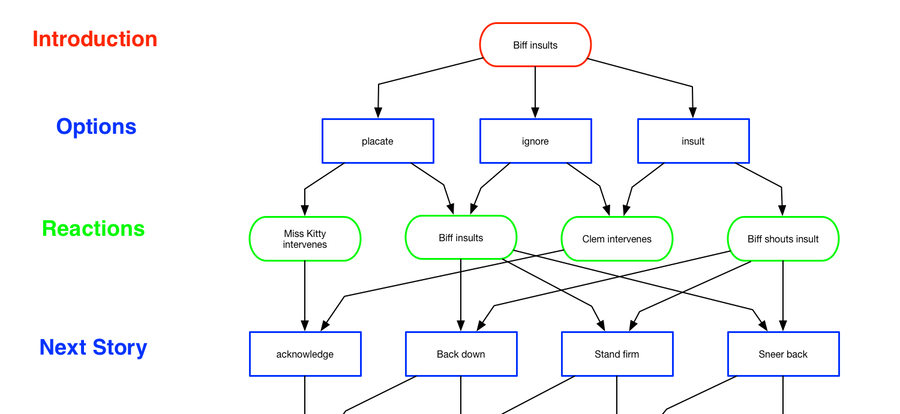All these prestigious literary lists from prestigiously fantasizing codexers nothing matter in game development. They only help put words into pleasant sentences and nothing more.
Story-line games are poorly compatible with system-interactive ones. If game is linear, or more precisely, the game is static and completely depends on the player - a good story will complement and enrich it. But in a system-interactive game, any plot will interfere with interactivity and will be taken outside of this interactivity (it will be good if it does not destroy part of the interactivity along the way). And every time you try to inject a plot into such a game it will conflict with the interactivity.
It is possible to tell a compelling story without sacrificing interactivity.
First two Diablos reduced storytelling to the quest giving, quest completion, environmental storytelling, some cinematics and lore dumps in dungeons and on items.
It is not groundbreaking or particularly original story, but it has twists, right amount of foreshadowing and it greatly enhances gameplay with suspension and anticipation.
Walls of text, endless dialogues and frequent cinematics break gameplay and immersion, and should be avoided.
They became staple of the genre thanks to BioWare's success in the 2000's, and lots of games still copy their formula.
Diablo confirms my point. The game is completely static and depends on the player. This is a classic example of a story-driven game without any interactive mechanics outside of the player's control.
Just to be sure what we talk about, describe to the forum what is "interactive mechanics outside of the player's control".
Maybe name few.
Lords & Kingdoms in Mount & Blade
Rangers & Dominators in Space Rangers 2
Kenshi factions
and any others who try to create dynamic and open gameworld. im not simply mean "sandboxes conflict with the plot and they don’t need it". Actually its universally for every game.
When you break your weapon on head of essential npc - this is conflict between plot and interactivity
When your party is not allowed into Pitax because there are important reasons - this is conflict between plot and interactivity
When in open game every quest it's just simple scattered tasks withnout any deep - this is conflict between plot and interactivity
They exclude each other.
You are not completely wrong.
I asked for clarification, because there are different kinds of mechanics outside of players control.
- RPG System or the rules mechanics, like breaking armor, weapon durability, rest - these don't neccesarily impede story and greatly increase interactivity.
- NPC mechanics - good games let you kill or break weapon to the head of essential NPCs and rarely hold your hand. You killed essential NPC? No world saving for you - that is your story now. As I remember, Fallout and F:NV let you kill almost anyone, in the contrast to the Bethesda entries in the franchise. But sure, examples of more limited "reactivity" are prevalent.
- "Immersive Sim" mechanics - interacting with environment in apparently free way - again, huge boost to interactivity, also great tool for storytelling without text. Bitch to implement properly, especially to incorporate with other mechanics.
- "Sandbox" mechanics - ones connected to the free roaming, non-linear exploration of the world. Superset of RPG system and Immersive Sim mechanics. Should make propapagation of reactions to players actions believable and make world seem "alive".You mentioned Space Rangers 2 and Mount & Blade, which had good, reactive open worlds. Hardest one to make properly, and most of your examples fall here.
Interactivity doesn't have to be absolute, "world is my oyster" at every step.
There is a difference between a toy and a game - toy can be interacted in whatever way you desire, often one maker did not anticipate.
Games have rules, great games predict attempts to break the rules and have response to it.
They have interactivity, but it is not limitless.
So, when you can't enter open world location because you didn't do some quest, it isn't conflict between interactivity and story per se.
Why should you be able to enter some city if you haven't solved prerequisited quests?
Why shouldn't game kill you instantly if you attack "essential" NPC?
If these things bother you, play with cheats, which make game more of a toy.
Linear story in interactive mediums should not exist; it is always branching story in the vein of CYOA.

It always feels weird when game forces you to linearity with some filter or siphon between chapters or installments in trilogies.
Modern AAA studios can't implement full reactiveness to their "open world games" with all the costs to development, cinematics, voice acting, motion capture...
Bling makes their games heavy and unelegant, hard to extend.
Older games had... let's call it "lower fidelity" - you didn't have to worry about unnecessary technical details, so smaller development teams could implement better reactiveness.
Also, less screeching wokists to please.
So those games were better in mixing interactivity and story.
But don't worry, here comes AI to the rescue, to generate all the superficial flavor to bland open worlds and make them more meaningless.
Not a RPG, but still a sign of times to come
TL;DR
It is not impossible to combine open world, story and interactivity, but it is rare and not easy to do the right way.
Interactivity is always limited in games, not only because of story.
And decline is stronger than ever.


















![The Year of Incline [2014] Codex 2014](/forums/smiles/campaign_tags/campaign_incline2014.png)




